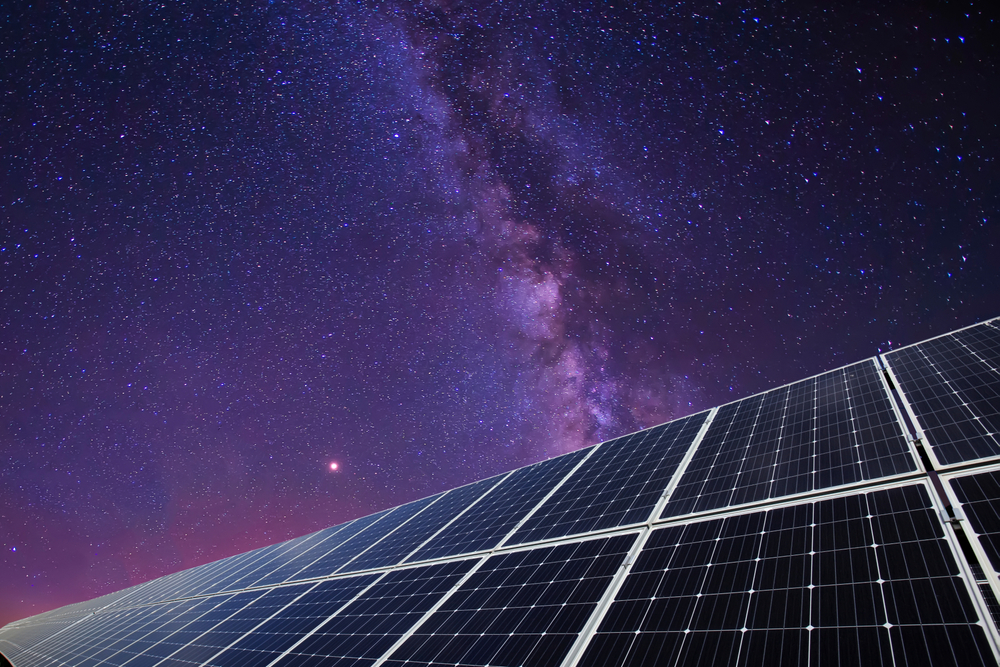Solar energy has become a popular and sustainable way to generate electricity for homes and businesses. With solar panels, people can harness the power of the sun, reduce energy costs, and help the environment. However, one common question often arises: “Does solar panel work at night?” Since solar panels depend on sunlight, understanding their functionality during nighttime hours is crucial for anyone considering investing in this renewable energy source.
In this guide, we’ll explore how solar panels operate, what happens when the sun goes down, and what solutions exist to ensure you have a steady power supply at night.
How Do Solar Panels Work During the Day?
To fully understand whether solar panels work at night, it’s essential to grasp how they function during daylight. These cells absorb photons from sunlight, which generates an electric current. This process is called the photovoltaic effect. The generated electricity is direct current (DC), which then gets converted into alternating current (AC) by an inverter, making it usable for your household appliances.
The Importance of Sunlight in Solar Power Generation
The more direct sunlight the panels receive, the more efficient they become. However, this also raises the question: What happens at night when there is no sunlight?
Do Solar Panels Work at Night?
The straightforward answer is no—solar panels do not produce electricity at night. Since solar panels rely on sunlight to generate power, they are inactive after sunset. But that doesn’t mean you’re left without power once it’s dark. There are several ways to maintain a continuous energy supply even when the sun isn’t shining.
Energy Storage: Solar Battery Solutions
The most effective way to ensure a constant electricity supply is by using a solar battery storage system. A solar battery stores excess energy produced by your solar panels during the day for use at night or on cloudy days. This stored energy can power your home when the solar panels aren’t actively producing electricity.
How Do Solar Batteries Work?
During the day, your solar panels often generate more energy than your home needs. This excess energy gets stored in a battery system rather than being sent back to the grid. At night, when the panels aren’t generating power, your home can draw energy from the battery.
How Long Can Solar Batteries Power a Home?
The duration that a solar battery can provide power depends on several factors, including the battery’s capacity and your household’s energy consumption. A well-sized solar battery can power essential appliances and lights for several hours, ensuring you have uninterrupted electricity even during the night.
Solar Panels and the Grid: Staying Connected
Another option for nighttime electricity is to stay connected to the utility grid. Many solar-powered homes are equipped with a grid-tied system. During the day, your solar panels may produce more energy than your home uses, and the excess is sent to the grid. In exchange, you receive credits through a process called net metering.
At night, when your solar panels aren’t working, you can use electricity from the grid without incurring additional costs, thanks to the credits earned during the day.
Grid-Tied Systems vs. Off-Grid Systems
- Grid-tied systems: These systems are connected to the local utility grid, allowing homeowners to use grid power when solar energy is unavailable. This ensures a reliable power supply without the need for large battery storage systems.
- Off-grid systems: These systems are entirely independent of the utility grid. Homes with off-grid systems must rely solely on solar battery storage or alternative power sources like generators for electricity at night.
Solar Panels and Net Metering: Maximizing Savings
Net metering is an arrangement between solar system owners and utility companies. When your solar panels produce more energy than your home needs, the excess is sent to the grid, and you receive credits on your electric bill. These credits can be used to offset the cost of the electricity you use from the grid at night.
Is Net Metering Available Everywhere?
Net metering policies vary depending on your location. Some states or countries offer full retail-rate net metering, while others provide a reduced rate. It’s essential to check local policies to understand how net metering can benefit you if you plan to rely on grid power during the night.
How to Ensure Power Supply at Night Without Solar Batteries
If you don’t have a solar battery storage system or a grid connection, ensuring power at night can be a challenge. However, alternative renewable energy solutions, such as wind turbines or backup generators, can complement your solar power system and provide electricity during the night.
Hybrid Solar Systems: Combining Solar with Other Energy Sources
A hybrid solar system integrates solar panels with another form of power generation, like a wind turbine or backup generator. This combination ensures a steady supply of energy, even when the sun isn’t shining.
Why Solar Power Is Still Worthwhile
Even though solar panels don’t generate electricity at night, they are still a valuable investment. The significant amount of energy produced during the day can be stored and used later, making solar power a cost-effective and eco-friendly option. Moreover, advances in solar battery technology are continuously improving storage capacity, making it easier to rely on solar energy 24/7.
The Long-Term Benefits of Solar Energy
- Lower energy bills: Solar panels reduce reliance on the grid, lowering your monthly utility costs.
- Environmental benefits: Solar energy is a clean, renewable resource that reduces carbon emissions.
- Energy independence: With solar power, especially when paired with battery storage, you become less reliant on external energy sources.
Busting Myths: Misconceptions About Solar Energy at Night
There are several misconceptions about how solar panels operate, especially when it comes to nighttime functionality. Let’s clear up some of these myths:
Myth 1: Solar Panels Produce Power in Moonlight
Some believe that solar panels can work with moonlight, but this is a myth. The moon simply reflects sunlight, and the amount of energy it provides is far too weak to generate electricity.
Myth 2: Solar Panels Don’t Work in Cloudy Environment
They just don’t work at full capacity. However, at night, with no sunlight at all, they don’t produce power.
Myth 3: Solar Energy Isn’t Reliable Without Constant Sunlight
With modern battery storage solutions and grid-tied systems, solar energy remains reliable, even without constant sunlight. These technologies ensure a continuous energy supply, regardless of the time of day.
What to Keep in Mind for Nighttime Solar Power Use
Solar energy systems have come a long way, and while solar panels don’t work at night, energy storage and grid-tied options offer effective solutions for maintaining a reliable power supply. If you’re considering solar power, here are some key factors to keep in mind:
- Invest in a solar battery storage system if you want to rely solely on solar energy, even at night.
- Check local net metering policies to maximize your savings.
- Consider a hybrid system for additional power generation options.
Final Thoughts: Is Solar Power Right for You?
To answer the question, “Does solar panel work at night?”—the answer is no, they don’t. However, with the right systems in place, like battery storage or a connection to the utility grid, you can still enjoy a consistent power supply 24/7. Solar power remains one of the best ways to reduce energy costs, contribute to a cleaner environment, and achieve energy independence.
Investing in solar energy is a long-term commitment that offers substantial benefits, even if the sun isn’t shining all the time.




